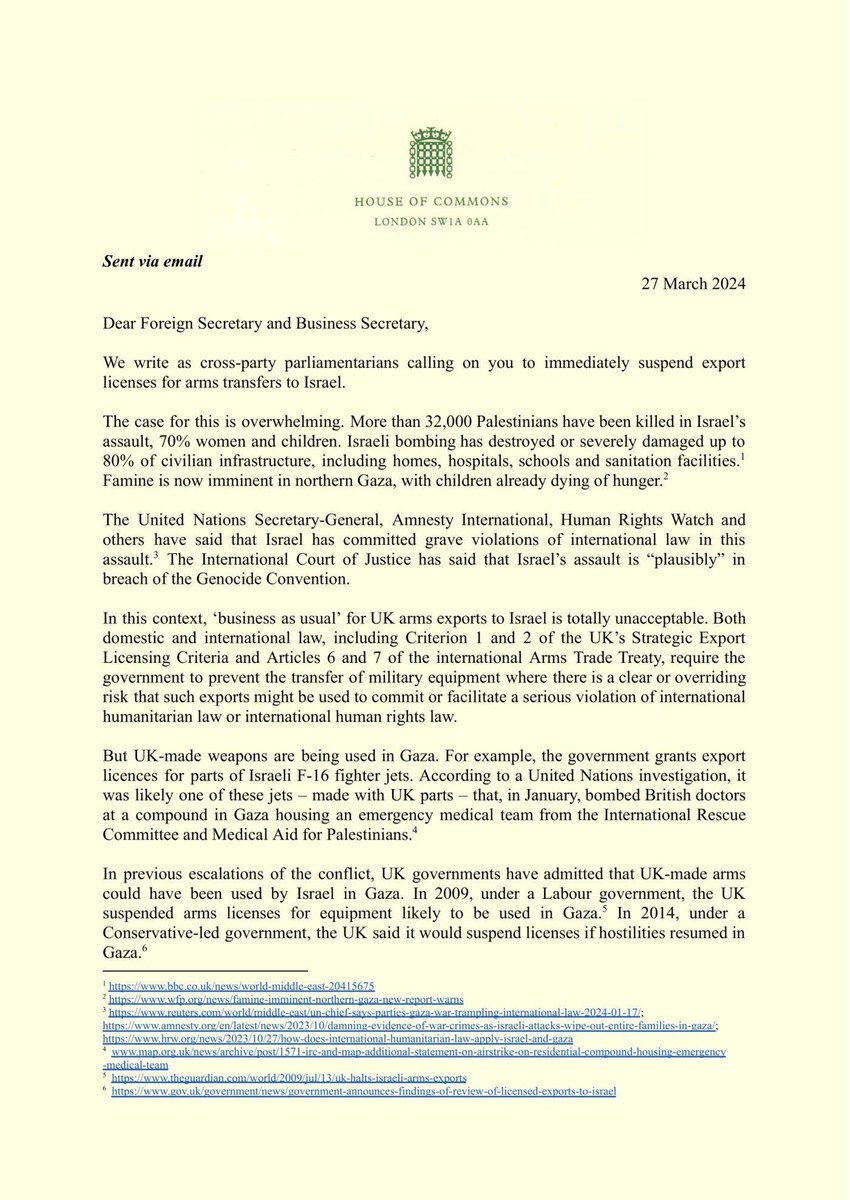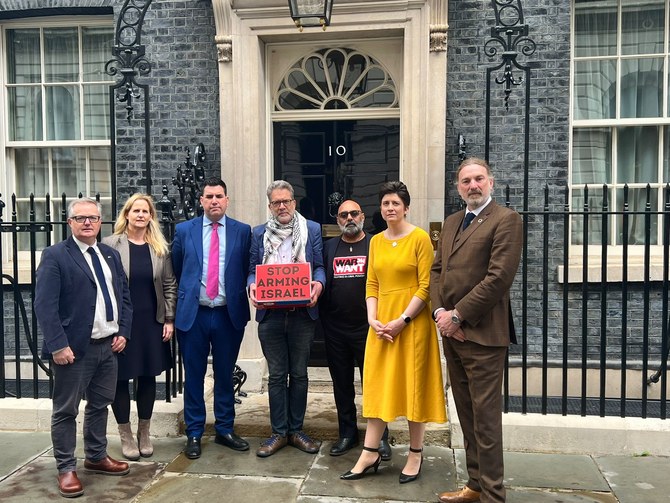LONDON: A petition calling for the UK government to halt arms sales to Israel was handed in to 10 Downing Street on Tuesday by a pro-Palestinian activist organization and a cross-party group of lawmakers.
Launched on April 2 and signed by almost 70,000 people, the document, which is addressed to UK Foreign Secretary David Cameron, also urges the government to publish any legal advice it has received regarding possible breaches of international law.
“On 2nd April 2024, Israel killed seven World Central Kitchen aid workers, including UK citizens, in targeted air strikes in the Gaza Strip,” the petition, drawn up by the UK-based Palestine Solidarity Campaign, said.
“This attack, on an agency distributing food to a population facing famine, is part of the broader Israeli war crime — as acknowledged by the EU’s foreign policy chief Josep Borrell — of intentionally using starvation as a weapon of war.
“It also comes following Israel’s two week siege on Al-Shifa hospital, killing over 400 Palestinians and leaving the hospital complex in ruins.”
The UK’s Strategic Export Licensing Criteria, under which all arms exports are assessed, specifies that the government will not grant a license if it determines “there is a clear risk that the items might be used to commit or facilitate internal repression … or a serious violation of international humanitarian law,” according to a January 2023 report on developments in UK strategic export controls.
“The ICJ (International Court of Justice) ruling of plausible genocide therefore requires the UK to immediately halt arms transfers to Israel,” the petition said.
“It is also understood the government has received — though not published — legal advice that Israel is breaking international humanitarian law which would also require a suspension of arms exports.”
The ICJ issued a landmark ruling in January finding it plausible that Israel’s acts could amount to genocide, offering the first concrete step toward possible sanctions.
“UN experts have called on all states to immediately suspend arms exports to Israel, as required by the 1949 Geneva Conventions and to comply with the Genocide Convention,” the petition said.
“The UK is putting itself at legal risk by ignoring this advice, and is also isolating itself from key international partners including Canada, Belgium, Spain, the Netherlands and Italy, who have all suspended their arms exports to Israel.”
Conservative Party MP Alicia Kearns, who chairs the Foreign Affairs Select Committee, on Friday said the UK Foreign Office “has received official legal advice that Israel has broken international humanitarian law, but the government has not announced it.”
On Monday in parliament, Prime Minister Rishi Sunak refused to deny the Foreign Office had received such advice and when asked by Labour Party MP Zarah Sultana whether Kearns was telling the truth said: “Israel is committed to and capable of complying with international humanitarian law.”
Ben Jamal, director of the PSC, said: “Israel’s genocidal assault on Palestinians and its attacks on Lebanon, Syria and Iran prove that arming it not only makes the UK complicit in violating international law but also in the sparking of a regional war with catastrophic consequences.
“Continuing to arm Israel cannot help the cause of peace or justice in the Middle East. Any government truly committed to upholding international law does not sell weapons to a state that continually breaches it.”
The Palestinian Health Ministry said on Tuesday that more than 33,000 Palestinians had been killed since Israel launched its assault on Gaza on Oct. 7, 70 percent of them women and children. Most of the civil infrastructure in the besieged enclave has been destroyed and the UN has issued warnings that famine is imminent for its population of 2 million people.
Israel uses British weaponry, surveillance technology and military equipment on Palestinians, and 15 percent of the components used by its F-35 aircraft to bomb Gaza are provided by the UK, according to the pro-Palestinian nongovernmental organization Friends of Al-Aqsa.
“Israeli bomber aircraft are being used in the ongoing genocide taking place in Gaza,” the UK-based group said.
According to a statement by the PSC, more than 1,000 lawyers, academics and retired judges, including the former President of the Supreme Court Baroness Brenda Hale, have signed an open letter stating that the “continued supply of arms to Israel puts the UK in breach of international law.”

On March 27, Sultana and a cross-party group of 134 UK lawmakers wrote to Cameron and Business Secretary Kemi Badenoch asking them to immediately suspend export licenses for arms transfers to Israel as “the case for this is overwhelming.”
Earlier this month, Cameron said the UK would not suspend arms sales to Israel, despite Canada, the Netherlands, Japan, Spain and Belgium announcing they would do so.
The PSC said it would lead a “Stop Arming Israel” rally outside parliament at 6 p.m. on Wednesday.




























